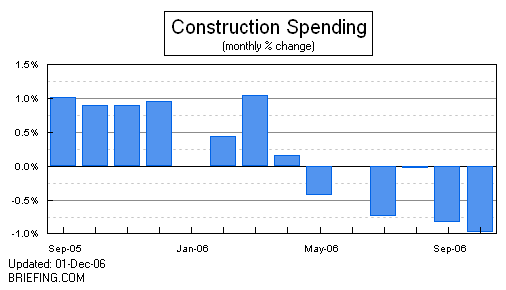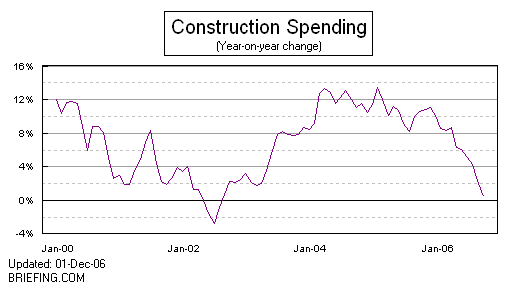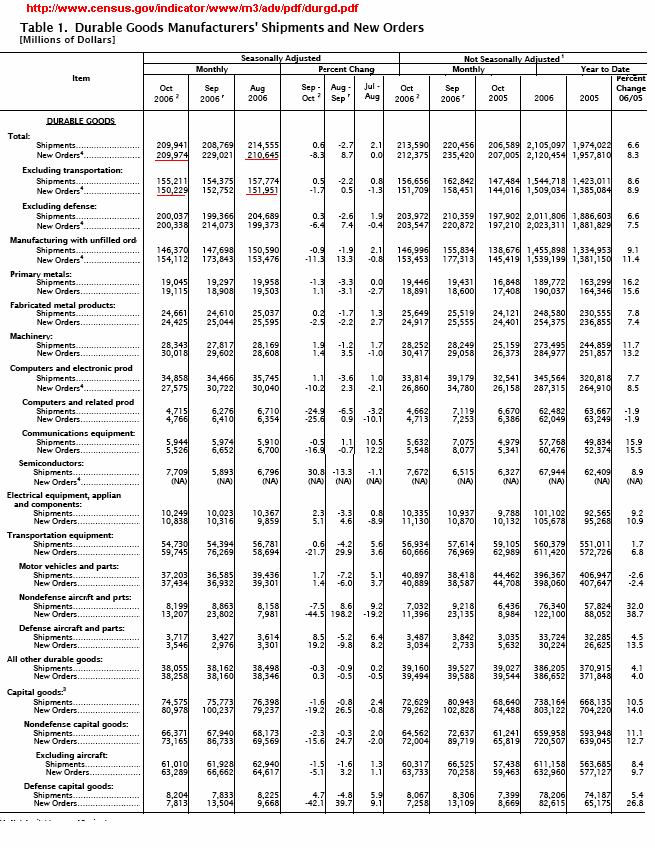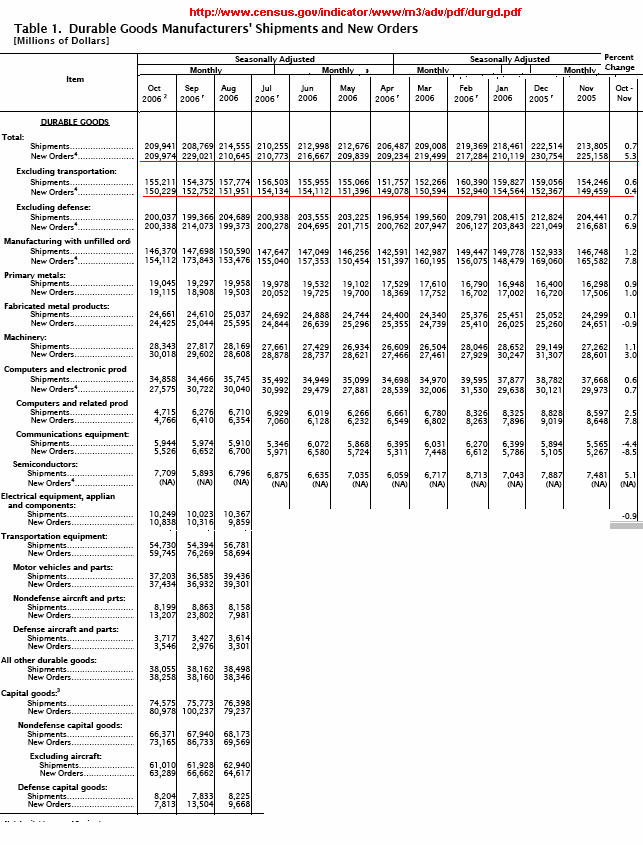Recession Likely
Today’s Construction Spending and Manufacturing reports provided still further evidence of a sinking economy. The 2 graphs below from Briefing.com show the overall trend.


Construction Spending declined 1%, leaving an annualized, seasonally-adjusted rate of $1.16 trillion. This was the largest decline since the recession in 2001. Residential Construction fell 1.9% in the last month. Residential Construction spending has also fallen for 7 consecutive months.
Since March, 100,000 housing-related jobs have been lost. Economist Zoltan Pozsar from Moody’s Economy.com, in today’s Yahoo News estimates that 300,000 more housing-related jobs will be lost in the next year.
Manufacturing also declined in today’s report. This is the first contraction in the Manufacturing sector in almost 4 years. Manufacturing employment also declined in November, with the ISM Manufacturing employment index declining to 49.2 in November from 50.8 in October. (Readings under 50 indicate a contraction.)
The dollar has dropped 3% in relation to the Euro in the last week, and 1.4% since Thursday morning (11/30/06).
The stock market has declined for the 2nd straight week.
All of this follows November 28th’s Durable Goods, which was much larger than predicted. The original Durable Goods orders prediction was for a decline of only 6.0%. The actual change was a -8.3%. Though much of this was simply an offset from last months increase “alleged” 8.7% increase, October’s total is still 0.3% less than August’s, and 0.38% less than July’s.
The August through October numbers can be seen on the chart below from the U.S. Census Bureau. The Durable Orders totals are underlined in red, as are the “Excluding Transportation” totals.

More importantly, Durable Goods orders have declined compared to October 2005, for a same month change of -1.8%. This can be seen from the composite chart below, made from the superimposition of monthly Durable Orders reports from the previous months, with information on the furthest month back coming from the January 2006 report by the Census Bureau.
(October 2005’s total was not available, so it was extrapolated from the percentage increase given between October – November 2005 change, shown in the far right column.) Once again, the Total and Ex-Transportation numbers are underlined in red.

From the above chart it appears Durable Orders peaked In December 2005, and have been generally declining since that time. Compared to December 2005’s peak of $230.754 billion, October of 2006 is down 9% to $209.974 billion.
Meanwhile, the Corporatists and the NeoCon-Artists continue to claim the economy is “the strongest ever” and claim the statistics support them. Of course, they never give those “supporting” statistics. There’s a reason for that. There aren’t any. The economy is sinking and a recession is very likely within the next year. All the Right-Wing propaganda in the world isn’t going to change this.
unlawflcombatnt
The economy needs balance between the “means of production” & “means of consumption.”



Personally I think the recession started several months ago. One of the barometers is the performance of Walmart. The company’s sales have been stagnating for several months and were only kept up by various tricks like cutting prices before Thanksgiving.
Walmart represents the canary in the coal mine. It’s customer base has an income in the mid $20K’s as opposed to say, Target, where the average is more like $40K. Thus, anything which affects the cash flow of the lower income sector will show up first in their spending behavior.
The first blow was the rising gas prices. Exactly what is sapping their money now still needs to be determined, but part of it could be lower income due to less work.
The bond market is also predicting a recession with long-term rates expected to go down as the Federal Reserve will be forced to drop rates to boost the economy.
I think the recession will be very odd with those at the top not feeling it at all (except for the drop in the stock market). Salaries in Manhattan in the financial sector have risen to $8,000 per week in the past year. Unless there are massive layoffs as happened after the last stock market crash these people will continue to clean up at everyone else’s expense.
The only question is whether the Fed will allow things to slide longer so as to permit blame to land on the new Dem majority and thus influence the 2008 election. Certainly if Greenspan was still in charge this is what would happen. I don’t know what Bernacke’s fealty to the Bush dynasty is.
Thanks to Unlawflcombatnt for posting this entry here. In January, Dems will face 3 challenges: Restoration of The Bill of Rights, A workable plan B for the Afghan – Iraq wars and rescuing the ‘fairy tale’ economy.
On the fairy economy; a year ago Prof. Nouriel Roubini warned of weakening and his pronouncements so far has been spot on. Prof. Roubini writes, there’ll be – a U.S. recession in 2007 and it’ll be severe – the five ugly realties.
‘A hard landing of the U.S. $’ began to unfold this past week – losing in 2006, 14% of its value!
Viewed with alarm in Europe, for decades we’ve been seen as borrowing 80% of the world’s net savings everyday to finance our non-stop spending.
“The dollar has been falling for much of this year but has taken a nosedive in the past few weeks, losing 4 per cent against the euro in the past month alone.[.]
[T]he danger is that the fall in the dollar could presage a major economic shock that would reverberate around the world.”
“Now here’s The $2 question: Is the dollar timed out?
The first blow was the rising gas prices. Exactly what is sapping their money now still needs to be determined, but part of it could be lower income due to less work.
Both, but still the main cause is gas prices. The other price increases have been fresh produce and food due to increased transportation cost, and in the south hurricane areas especially, rising insurance premiums. Houses around me are going up for sale because of it and for the balloon mortgages they came with. Also, as federal taxes were cut, so was federal support cut to states and cities. As such, rises in local taxes & fees have increased to offset the difference. The problem with this is that these new taxes and fees fell on the populace evenly and there goes more cash out of the economy.
Take a couple of hundred bucks a month away from someone making 20-30k a year and multiply that by, oh, I don’t know, maybe, 50 million.
There’s your economy in a nutshell.
And there’s no truthiness in those government stats.
Revealed: the real rate of inflation, up to four times the government’s published rate
No difference on this side of the pond.
Wal-mart is a barameter to a certain extent, but remember wal-mart is no longer the cheapest place in town. However, there are two notes about wal-mart. First a graph of their sales was once posted, and spiked on the 15th & 30th Payday..for working folks. Next, Wal-Mart calculated that for every 10 Cents in the hike of gas meant their customer base would spend 1 billion dollars less a their stores.
I believe the housing market will cause the recession due to a less demand for durable goods, washer/dryer, etc..
W has delcared war on the working wo/man, and with a Democratic Congress we can finally expect some help.